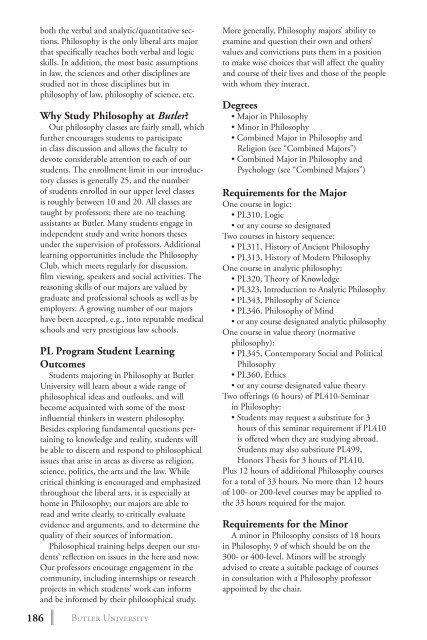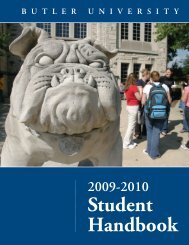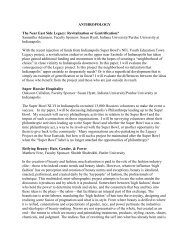2 0 1 3 bulletin - Butler University
2 0 1 3 bulletin - Butler University
2 0 1 3 bulletin - Butler University
Create successful ePaper yourself
Turn your PDF publications into a flip-book with our unique Google optimized e-Paper software.
186<br />
both the verbal and analytic/quantitative sections.<br />
Philosophy is the only liberal arts major<br />
that specifically teaches both verbal and logic<br />
skills. In addition, the most basic assumptions<br />
in law, the sciences and other disciplines are<br />
studied not in those disciplines but in<br />
philosophy of law, philosophy of science, etc.<br />
Why Study Philosophy at <strong>Butler</strong>?<br />
Our philosophy classes are fairly small, which<br />
further encourages students to participate<br />
in class discussion and allows the faculty to<br />
devote considerable attention to each of our<br />
students. The enrollment limit in our introductory<br />
classes is generally 25, and the number<br />
of students enrolled in our upper level classes<br />
is roughly between 10 and 20. All classes are<br />
taught by professors; there are no teaching<br />
assistants at <strong>Butler</strong>. Many students engage in<br />
independent study and write honors theses<br />
under the supervision of professors. Additional<br />
learning opportunities include the Philosophy<br />
Club, which meets regularly for discussion,<br />
film viewing, speakers and social activities. The<br />
reasoning skills of our majors are valued by<br />
graduate and professional schools as well as by<br />
employers. A growing number of our majors<br />
have been accepted, e.g., into reputable medical<br />
schools and very prestigious law schools.<br />
PL Program Student Learning<br />
Outcomes<br />
Students majoring in Philosophy at <strong>Butler</strong><br />
<strong>University</strong> will learn about a wide range of<br />
philosophical ideas and outlooks, and will<br />
become acquainted with some of the most<br />
influential thinkers in western philosophy.<br />
Besides exploring fundamental questions pertaining<br />
to knowledge and reality, students will<br />
be able to discern and respond to philosophical<br />
issues that arise in areas as diverse as religion,<br />
science, politics, the arts and the law. While<br />
critical thinking is encouraged and emphasized<br />
throughout the liberal arts, it is especially at<br />
home in Philosophy; our majors are able to<br />
read and write clearly, to critically evaluate<br />
evidence and arguments, and to determine the<br />
quality of their sources of information.<br />
Philosophical training helps deepen our students’<br />
reflection on issues in the here and now.<br />
Our professors encourage engagement in the<br />
community, including internships or research<br />
projects in which students’ work can inform<br />
and be informed by their philosophical study.<br />
<strong>Butler</strong> <strong>University</strong><br />
More generally, Philosophy majors’ ability to<br />
examine and question their own and others’<br />
values and convictions puts them in a position<br />
to make wise choices that will affect the quality<br />
and course of their lives and those of the people<br />
with whom they interact.<br />
Degrees<br />
• Major in Philosophy<br />
• Minor in Philosophy<br />
• Combined Major in Philosophy and<br />
Religion (see “Combined Majors”)<br />
• Combined Major in Philosophy and<br />
Psychology (see “Combined Majors”)<br />
Requirements for the Major<br />
One course in logic:<br />
• PL310, Logic<br />
• or any course so designated<br />
Two courses in history sequence:<br />
• PL311, History of Ancient Philosophy<br />
• PL313, History of Modern Philosophy<br />
One course in analytic philosophy:<br />
• PL320, Theory of Knowledge<br />
• PL323, Introduction to Analytic Philosophy<br />
• PL343, Philosophy of Science<br />
• PL346, Philosophy of Mind<br />
• or any course designated analytic philosophy<br />
One course in value theory (normative<br />
philosophy):<br />
• PL345, Contemporary Social and Political<br />
Philosophy<br />
• PL360, Ethics<br />
• or any course designated value theory<br />
Two offerings (6 hours) of PL410-Seminar<br />
in Philosophy:<br />
• Students may request a substitute for 3<br />
hours of this seminar requirement if PL410<br />
is offered when they are studying abroad.<br />
Students may also substitute PL499,<br />
Honors Thesis for 3 hours of PL410.<br />
Plus 12 hours of additional Philosophy courses<br />
for a total of 33 hours. No more than 12 hours<br />
of 100- or 200-level courses may be applied to<br />
the 33 hours required for the major.<br />
Requirements for the Minor<br />
A minor in Philosophy consists of 18 hours<br />
in Philosophy, 9 of which should be on the<br />
300- or 400-level. Minors will be strongly<br />
advised to create a suitable package of courses<br />
in consultation with a Philosophy professor<br />
appointed by the chair.
















